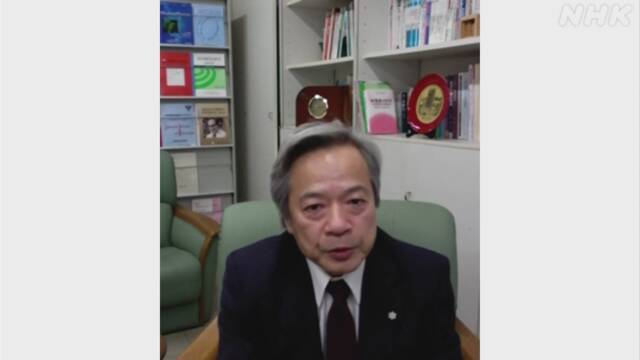Abnormal olfaction but not stuffy nose "suspecting new corona infection" expert May 8 18:49
By infecting with the new coronavirus, the mechanism of the olfactory disorder that makes people no longer feel the smell was clarified. It is necessary to suspect the infection, and even if you do not have symptoms such as fever, you should act on the premise of the infection. "
Regarding the abnormality of the sense of smell caused by the infection with the new coronavirus, a virus-infected professional baseball player, Shintaro Fujinami of Hanshin, said at a press conference after discharge, `` I have a strange feeling that my nose is clear but I do not smell. As mentioned above, reports of feeling abnormal olfaction without runny nose or stuffy nose occurred one after another in Japan and abroad, and the CDC = Center for Disease Control in the United States also had an example of symptoms when infected with the new coronavirus last month. Is added as.
According to Professor Takaki Miwa of Kanazawa Medical University, who is familiar with the treatment of olfactory disorders, olfactory disorders may occur after symptoms such as runny nose and stuffy nose due to a common cold or flu, but other symptoms. There is no other case of sudden frequent occurrence of olfactory disorder even when there is no such thing.
In the latest research on this olfactory disorder by a group in Europe and the United States, a new coronavirus interferes with the function of nerves that sense odor by infecting from specific cells in the back of the nose, so that the mechanism of olfaction can occur without nasal congestion. It's clear.
Prof. Miwa said, "Sudden olfactory disorder must be suspected of being infected as a characteristic symptom of the new coronavirus, and we should act on the assumption that we are infected even if there are no symptoms such as fever. According to the case reports, there is no immediate illness due to an olfactory disorder, so I would like you to take a rest at home and first consult a doctor by telephone etc. ”
Mechanism of olfactory dysfunction due to new corona infection
Professor Koki Miwa of Kanazawa Medical University, who is familiar with the treatment of olfactory disorders, examined 1683 patients who visited the olfactory outpatient department of a university hospital during the past 10 years until June last year, and found the most common cause of olfactory disorders. Is sinusitis with 39%, followed by viral infection and unknown cause with 21% each.
Of these, the olfactory dysfunction caused by sinusitis is caused by chronic runny nose and stuffy nose, and the olfactory dysfunction caused by viral infection is common cold and flu, and after the onset of symptoms such as runny nose and stuffy nose It is said that this is caused by damage to nerve cells that feel.
So why is it that patients infected with the new coronavirus have no snot and no stuffy nose, but no smell?
Normally, humans sense odors by capturing odor molecules in nerve cells called “olfactory cells” located in the back of the nose and sending signals to the brain.
Supporting this "olfactory cell" is another cell called "supporting cell". According to the latest reports from research groups in Europe and the United States, "supporting cells" have a protein called "receptor" that serves as a saucer for new coronavirus to enter human cells.
Professor Miwa pointed out that the infection of the new coronavirus causes swelling of "supporting cells" due to inflammation, and blocking the passage of odor molecules to prevent the molecules from reaching the "olfactory cells" may be the cause of olfactory disorder. I will.
For this reason, if the swelling of "supporting cells" is reduced after the infection is recovered, it is highly likely that the olfactory disorder will be resolved within a relatively short period of 2 to 3 weeks.
Professor Miwa said, `` This olfactory disorder is caused by a mechanism that is not related to stuffy nose, and this mechanism has not been confirmed in common colds or influenza, and it can be said that it is a symptom peculiar to a person infected with the new coronavirus. ”
Over 80% of infected patients in Europe have impaired sense of smell and taste
Last month, a paper published by a European research group reported that more than 80% of patients infected with the novel coronavirus had olfactory disorders.
According to the results, out of 417 patients with mild to moderate symptoms treated at 12 hospitals in Europe such as Belgium and France, 357 (85.6%) were confirmed to have an olfactory disorder.
In addition, the research group confirmed that 88% of the patients also had taste disorders in which the taste was lost. "Sudden olfactory disorders and taste disorders were recognized as important symptoms of novel coronavirus infections internationally. It needs to be recognized. "

